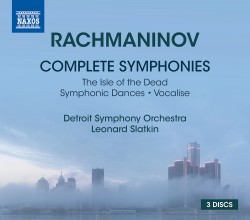 Rachmaninov – Complete Symphonies; Isle of the Dead; Symphonic Dances; Vocalise
Rachmaninov – Complete Symphonies; Isle of the Dead; Symphonic Dances; Vocalise
Detroit Symphony Orchestra; Leonard Slatkin
Naxos 8.503278 (naxos.com/CatalogueDetail/?id=8.503278)
As I am writing this, the wistful opening motto theme of the Third Symphony is reverberating in my mind and I am marvelling at how beautifully Rachmaninov establishes an atmosphere and the symphony a world of its own, so different from anything he wrote before. I have never heard it in a concert hall either, mainly because apart from the piano concertos, his orchestral works are rarely performed. So this highly acclaimed new issue by Naxos is very welcome.
Leonard Slatkin, who has over the years became a conductor of stature with a worldwide reputation, is thoroughly inside the music with an authoritative grip on the score and this reflects on the musicians of the Detroit Symphony who seem to be in love with the music. And in HD orchestral sound they sound better than ever.
The 3CD set contains the Three Symphonies and the Symphonic Dances plus the symphonic poem Isle of the Dead and Vocalise, a short orchestral piece. It should be noted that the First Symphony failed disastrously at its premiere and its score was lost until miraculously the orchestral parts were found many years later. It is a youthful work with intense passion but it bears no comparison to what he would produce later. Isle of the Dead is interesting; inspired by a Romantic Russian painting, it describes Charon on the River Styx rowing the dead across to the other shore. We can hear the sinister undulating motion of the oars in very dark hued music. Its 5/8 rhythm must be a challenge for the conductor, but it comes off very well under Slatkin.
The Second Symphony is arguably the best and the most popular and has always been my favourite. It’s a glorious work with lavish orchestration and it “has a sustained vitality, rich in lyrical invention and a glowing eloquence capable of rising to extraordinary power” as described very aptly by British musicologist Robin Hill. It had a tremendous success and this recording, being a live performance, has a spontaneous enthusiastic outburst of applause. I wholly concur and it’s worth buying the set for this alone.
Another wonderful highlight is Vocalise which to me is the best thing Rachmaninov ever wrote. It’s a short (less than ten-minute) work for small orchestra with such an underlying sustained melancholy I’ve seen conductors literally in a hypnotic trance conducting with closed eyes.
Rachmaninov could be regarded as a connecting tissue between Tchaikovsky and Shostakovich (or Prokofiev) but he preferred to look forward rather than backward, so he moved away from lush Romantic orchestration towards lighter and cleaner textures, a tighter, more economical orchestration. This is manifest in his Symphony No.3 in A Minor. It is in three movements but don’t let this fool you. The composer cleverly encloses a Scherzo inside the second movement, so we are not shortchanged. I find that the wealth of diverse musical ideas and their adventurous handling puts this symphony ahead of the second and it’s a shame it’s hardly ever played. In a similar vein, Symphonic Dances (1940) is a most enjoyable lighthearted piece with emphasis on dance rhythms (e.g., the second movement is a decadent waltz the Russians are quite good at) that concludes this remarkable set.



